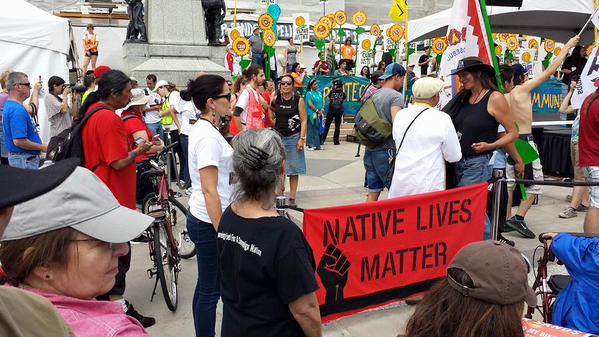One year following the flashpoint unleashed in Ferguson after the shooting death of unarmed teenager Michael Brown by officer Darren Wilson, Ferguson may look somewhat different, but their reality has been dismal compared to the promises made in order to bring about an end to the protests that gripped the community.
As a nation, we watched the news. The majority of whites (80%) still do not see why these protests happen. They do not understand that, in contrast, nearly 78% of the national black community sees police forces in their communities in much the same light as those in Ferguson did one year ago. We have seen the growth of the #BlackLivesMatter movement, and the backlash for that advocacy. We have listened to a national conversation that has ended in the deafening roar of silence rather than the changes the people recognized were needed.
We now watch as police forces reluctantly pass new rules and policies, slow to introduce new tactics and unwilling to open real conversation with those they are charged with “protecting and serving.” A prime example comes from Ferguson itself, where the city council has reviewed the proposal from the Department of Justice following their investigation that found evidence of a profit-driven court system and widespread racial bias by police. A recent report stated, “Ferguson Councilman Wesley Bell described the Justice Department’s plan as a typical bargaining tactic. “The DOJ didn’t expect us to accept their first proposal. This is just part of the negotiations,” said Bell, elected to the council in April. “That’s all. You want $200. You ask for $400.” With this attitude being prevalent among the predominately white city council, how are the people of Ferguson expected to believe change is coming?
According to The Counted, 695 people have been killed by police or law enforcement agencies since the beginning of 2015 alone (as of August 7, 2015). On average, that is more than 3 people per day. If any other organization or group ran around killing 3 American civilians per day without accountability and with a seemingly all-but spotless record of no wrong doing, we would demand action. (The Counted is a project working to count the number of people killed by police and other law enforcement agencies in the United States throughout 2015, to monitor their demographics and to tell the stories of how they died.)
Most recently, the death of Sandra Bland in a Texas jail cell defies explanation. It has led to attention of black women being abused and violated by police on a regular basis, yet going unreported. As a result, a demand to force those responsible to “Say Her Name” when there are victims has given rise to the movement #SayHerName.
Ferguson continues to weep. Deserving of every tear, these people have endured what most communities will never experience. Any mother, any parent, that can not take pause at the grief and sorrow of Michael’s mother is as heartless as his killer. Ferguson’s new police Lieutenant proudly says things are better, because she sees officers talking to each other and smiling more. Does she see that on the streets of the community they serve? Has anyone from the department looked?

Photo NLM Coalition via Twitter
Most Americans are unaware that the community that sees more abuse and violence from police and law enforcement agencies throughout America is the Native American community. Vastly under-reported and swept under the rugs in our halls of “justice”, these people have no where to turn for help. “It is a tribal issue,” they are told, if they are able to complain at all. As such, we are finally beginning to see the rise of #NativeLivesMatter.
When the international community looks at America and sees the treatment of our most marginalized citizens as human rights abuses and calls us on the carpet for it, shouldn’t we look more carefully within our own shores before starting up our war machines to invade countries we charge with human rights abuses?
We have a long way to go, America. You can not close the book on the chapter of Ferguson and assume Michael Brown’s story has ended, unless you also close the book on all the other lives that will be lost if we do not confront these issues as a population, and stop waiting for our government to do what it has failed miserably at doing up to this point.
May Michael Brown be able to Rest in Peace – some day.



